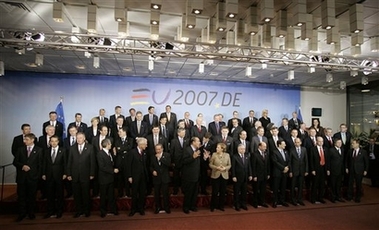EU leaders agree to cut greenhouse gases
(AP)Updated: 2007-03-09 19:57
BRUSSELS, Belgium - European Union leaders reached a broad agreement on an ambitious plan to cut greenhouse gases and switch to renewable energy sources as part of the fight against global warming.
 German Chancellor Angela Merkel, center right, speaks with French President Jacques Chirac, center left, during a group photo at an EU summit in Brussels, Thursday March 8, 2007. [AP]  |
The final draft statement, to be endorsed at a summit of EU leaders, promised energy solidarity between EU nations in the event of a supply crisis, as demanded by Poland, and notes that nuclear energy meets the growing concerns about safety of supply - a phrase crucial for the Czechs and Slovaks, who had been holding out on approval of the target.
The statement, seen by The Associated Press, also said that from the overall 20 percent target for renewables, "differentiated national overall targets should be derived ... with due regard to a fair and adequate allocation taking account of different national starting points."
"This text really gives European Union (energy) policies a new quality and will establish us as a world pioneer," Merkel told reporters as she arrived at the talks Friday.
The EU's ambitious new environmental agenda aims to slash the emissions of greenhouse gases blamed for pushing up the world's temperature and use more green energy sources like wind and solar power.
On Thursday, the 27 EU leaders pledged to cut greenhouse gas emissions by 20 percent from 1990 levels by 2020, saying they will raise that target to 30 percent if other major polluters like the United States and China join them.
There was some disagreement Thursday over the principle of ensuring the 20 percent of the EU's energy will come from renewable sources like water, wind or solar power by 2020.
Poland, Slovakia and some other new EU members from former Communist central Europe nations had argued that they do not have the money to invest in costly alternatives and preferred to stay with cheaper, but more polluting options such as coal and oil.
They suggested a burden-sharing system whereby nations with more advanced alternative energy programs would go beyond the 20 percent threshold, while others were given more time to hit the target.
"Not all countries will be able to achieve this threshold," said Polish President Lech Kaczynski, adding that Poland would accept mandatory targets only if they were tailored to individual nations.
Meanwhile, France joined the Czechs, Bulgarians and Slovaks in arguing that nuclear power should be included in Europe's plans to switch to a low-carbon economy.
However Austria, Ireland and Denmark do not want the EU to sanction nuclear power.
Merkel, who will also host a meeting of the Group of Eight industrialized nations in June, wants the EU summit to set a global challenge to US, Canada, Russia, Japan and other nations to agree on deep emissions cuts.
"Europe only produces 15 percent of global CO2," Merkel said. "The real climate problem will not be solved by Europe alone."
|
||
|
||
|
|